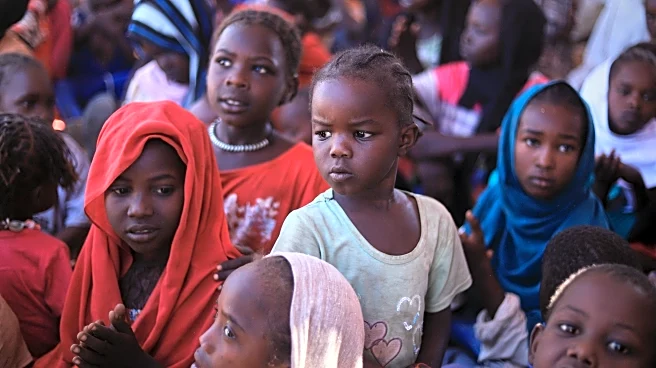CAIRO (AP) — The Rapid Support Forces, a paramilitary group that has been at war with the Sudanese military for over two years, said Thursday it has agreed to a humanitarian truce that was proposed by U.S.-led mediator group, also known as the Quad.
The agreement to the proposal comes over a week after the RSF seized el-Fasher city that has been under siege for over 18 months. It was also the last Sudanese military stronghold in Sudan’s western Darfur
region.
“The Rapid Support Forces also looks forward to implementing the agreement and immediately commencing discussions on the arrangements for a cessation of hostilities and the fundamental principles guiding the political process in Sudan, in a manner that addresses the root causes of the conflicts, ends the suffering of the Sudanese people,” the RSF statement read.
A Sudan military official told The Associated Press that the army will only agree to a truce when the RSF completely withdraws from civilian areas and give up weapons as per previous peace proposals. The official spoke on the condition of anonymity to discuss the matter.
Massad Boulos, a U.S. adviser for African affairs, said the U.S. was working with the Sudanese army and RSF to bring about a humanitarian truce and could have an announcement “soon.”
“We were working on this for the last almost 10 days with both sides, hoping to finalize the details,” Boulos told the AP in an interview on Monday. The U.S.-led plan would start with a three-month humanitarian truce followed by a nine-month political process, he said.
The U.S. has been working with Saudi Arabia, Egypt and the United Arab Emirates — the Quad — on ways to end the war.
New waves of displacement in Sudan are raising alarm among aid groups and local doctors, who warn that the influx of people is putting additional strain on already overcrowded camps struggling with scarce resources.
The non-profit Islamic Relief warned in a statement Thursday that community kitchens that provide a lifeline to many families are at risk of collapse. A new survey by the group found that 83% of families in east and west Sudan are now without enough food.
On Wednesday, Sudan’s Doctors Network warned that humanitarian conditions are worsening in displacement camps west of el-Fasher, including in Tawila, Kurma, and Golo with the significant increase in the number of displaced people fleeing that exceeds 36,000 in recent days.
Humanitarian organizations have long labeled Sudan as having one of the most alarming displacement crises in the world. Most recently, more people were displaced after el-Fasher, the capital of North Darfur and the last Sudanese military stronghold, was overtaken by the RSF after a series of attacks by the group that ran rampant in the city that has been under siege for over a year.
The paramilitary group killed over 450 people at a local hospital, according to the World Health Organization (WHO) and carried out house-to-house killings and committed sexual assaults.
The war between the RSF and the military began in 2023, when tensions erupted between the two former allies that were meant to oversee a democratic transition after a 2019 uprising. The fighting has killed at least 40,000 people, according to the WHO, and displaced 12 million. However, aid groups say the true death toll could be many times higher. Over 24 million people are also facing acute food insecurity, according to the World Food Program.
Over 70,000 people fled el-Fasher in single week, according to the International Organization for Migration, joining hundreds of thousands already displaced in the region. Some of those who fled reached the Northern State mostly on foot through an unsafe journey especially for women and girls.
An influx of displaced people recently fled el-Fasher to arrive at Al-Affad displacement camp in the town of Al-Dabbah in the Northern State, which is some 350 kilometers from the capital Khartoum.
Several people who spoke to AP this week recounted harrowing details of their escape from El-Fasher. Othman Mohamed, a teacher who fled the city at the end of September, said he saw bodies scattered along the road and people collapsing from exhaustion and abuse during the journey.
He said he had lived in a crisis in el-Fasher where drones and artillery were often used and food was barely available. People often survived on Ombaz until it was hard to obtain at some point. Ombaz is what is left from pressing peanut oil.
“In el-Fasher there’s nothing but beating and killing using drones in the sky that you can’t see but it hits you. The drone strikes you without you feeling it,” said Rawda Mohamed, who spent long hours walking to Al-Affad camp.















